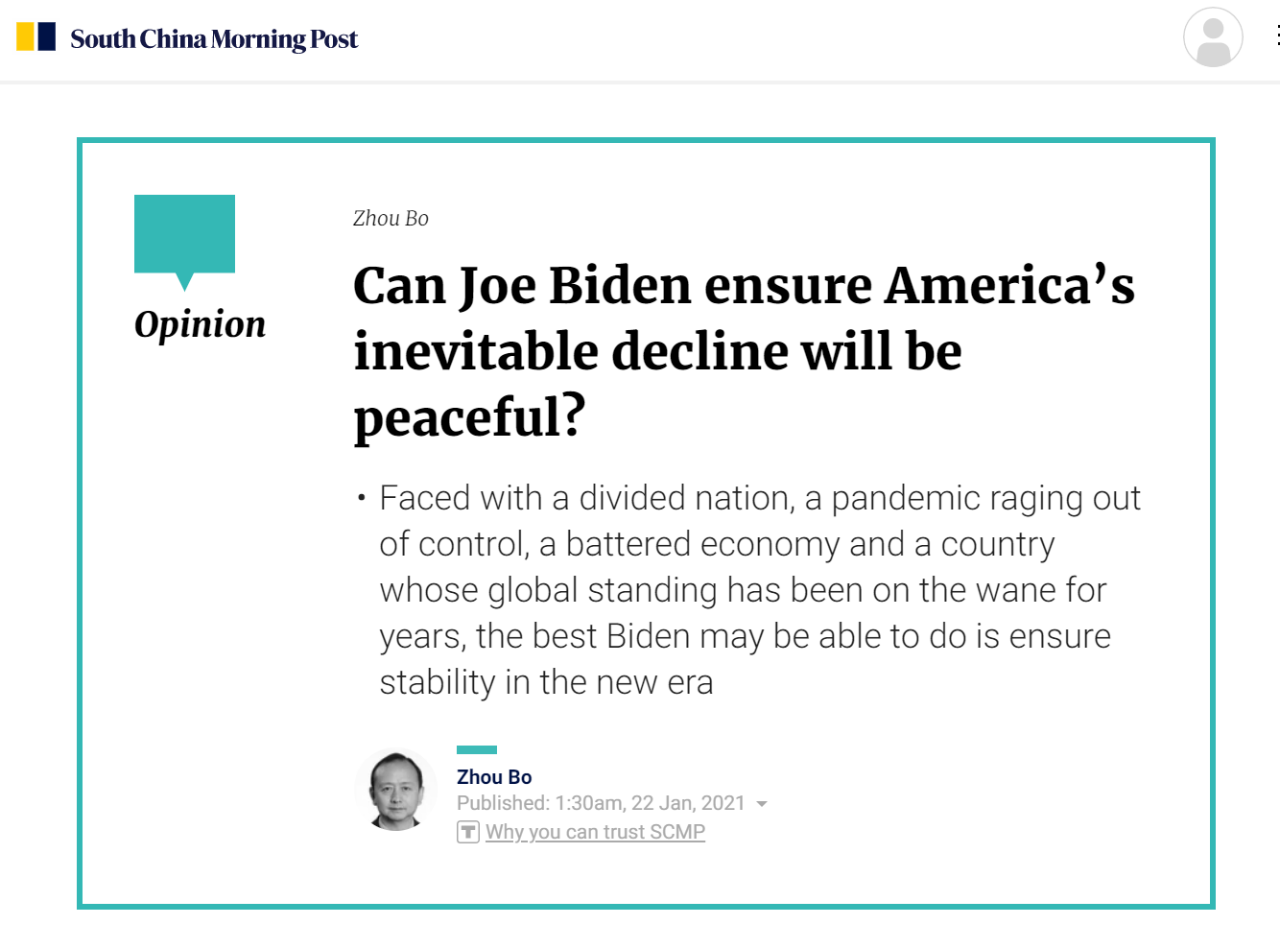编者按
拜登宣誓就职翌日,清华大学战略与安全研究中心研究员、中国论坛特约专家周波在南华早报发表署名文章《拜登能确保美国不可避免的衰落是和平的吗?》。周波认为,21世纪面临的最大挑战并非中国的崛起,而是美国的衰落。国会暴乱之后,拜登必须与国内的敌人做斗争,并同时应对从遏制疫情蔓延、拯救遭受重创的经济到恢复种族正义和对体制的信心等一系列挑战。他不大可能成为带领以色列人走出埃及的摩西,更有可能是带领美国人民走下“山巅之城”的人。此文是周波该主题系列文章第三篇。第一篇《美国要意识到自己不过是国际社会的一员而已》(详见下文系列阅读链接1)、第二篇《美国会和平衰落吗》(详见下文系列阅读链接2)先后于2018年10月和2019年1月刊登于南华早报。CISS公号集中编译推出,以飨读者。

拜登已成为美国第46任总统。他的前任特朗普已被二次弹劾。这两个都是好消息。
回顾特朗普政府的四年,人们可能会感慨,为什么一个平均每天发布20条虚假和误导性消息,并最终煽动一群暴徒冲击国会大厦的人,会当选为地球上最强大国家的总统?为什么他在11月的总统选举中得到7400万美国选民的支持?
两年前我提出,21世纪我们面临的最大挑战并非中国的崛起,而是美国的衰落。迄今中国的崛起是和平的,但美国的衰落会同样和平吗?
如果说五角大楼在冷战后一直不断的军事干预削弱了美国的国力——这一点现在几乎没人否认——它们也表明美国的衰落,无论多么缓慢,都远远不会是稳定的。
美国参议院少数党领袖舒默宣称,2021年1月6日可能会被列入“美国历史上的几个耻辱日的清单”。不止如此。对国会大厦的围攻表明,当一个“民主国家”走下坡路时,民主本身可能会变得刻薄恶毒、暴力血腥。
坏消息是,特朗普主义不会轻易消失。如果仅仅弹劾而不审判特朗普,并不能阻止他于2024年再次竞选总统。正如去年11月《时代》周刊一篇文章的标题所警告的那样,“即使拜登赢了,他管理的也会是‘特朗普的美国‘”。
随着美国历史上第二高的选票落入特朗普手中,美国几乎是痛苦地被一劈两半。
据信马克吐温说过:“历史不会重演,但它会押韵。”拜登现在可能会发现自己的处境与美国第16任总统林肯(Abraham Lincoln)所面临的情形如出一辙:内战结束了,整个国家都在等待疗伤。
林肯领导下的美国只需要民族和解,这也是今天的美国所需要的。但是拜登还必须与国内的敌人做斗争,并同时应对从遏制疫情蔓延、拯救遭受重创的经济到恢复种族正义和对体制的信心等一系列挑战。
那需要多长时间?这位78岁的“好人”——美国前总统布什(George W. Bush)这样称呼他——能取得多大成就?即使他肩负使命——他必须肩负——他也不大可能成为带领以色列人走出埃及的摩西。
他更有可能是带领美国人民走下“山巅之城”的人,无论大家有多么不情愿。
他可能已经意识到了这点。他说,“美国历史并不是一个保证有幸福结局的童话故事。但我们有能力为这个国家书写我们想要的未来”。
在海外,他的任务似乎容易些,部分原因是因为美国人民厌倦了他们的士兵没完没了地打仗,且美国要在很远的地方履行世界警察的责任。这次大疫情,加上乔治·弗洛伊德之死和国会大厦骚乱引发的暴力事件,将增加美国人对未来的担忧。
根据纽约时报“要点“栏目和锡耶纳学院去年进行的一项全国性调查,美国人与其说是为自己担心,不如说是为国家焦虑。退回到孤立主义看来已是不可避免。
拜登已经宣布,美国将重新加入巴黎气候协议和世界卫生组织,他曾承诺“在第一天”就会这样做。
但重新加入伊核协议将困难重重。预计伊朗会要个高价作为重返协议的条件。据纽约时报报道,伊朗制造核武器—伊朗否认这一野心—的可能“突破”时间就在一年之内。
与特朗普称欧盟为“敌人”不同,拜登将拥抱美国的盟友。尽管双方都说得好听,但以往双方关系中所表现的热情已经黯淡。
关于欧洲的“战略自主“,人们已经说了很多。这一概念引发了更多的警惕、分歧和嘲笑,而非赞同。核心问题是,欧洲自认为是世界重要力量,而美国在欧洲人看来越来越不靠谱。拜登将如何召开被大力渲染的民主国家峰会,仍有待观察。在美国被玷污的国家形象之下,很难想象他的演讲如何听起来不像笑话。
接着是与中国的竞争。在美国定义的大国竞争时代,如果两国只能在气候变化和危机管控等一两个方面进行合作,那我们实际上已经进入了一场新冷战,因为美国和苏联也都曾进行过零星的合作,如根除天花和太空探索。可悲的是,现在世界上两个最大的经济体连合作应对新冠肺炎疫情也无法达成一致。
与中国的竞争是特朗普的主要外交政策遗产之一,得到了两党的一致支持。拜登很难阻止这一点,但他可以拯救中美关系,使其免于陷入自由落体。
正因为两国关系已经严重恶化,拜登可以与特朗普背道而驰,使两国关系回归正常。
一个很好的例子就是中国和欧洲经过七年谈判后签署的投资协议。签一个类似的中美贸易协议难道不比特朗普打一场失败的对华贸易战更好吗?
拜登在2019年宣布参加总统竞选时说,“历史将把本届(特朗普)政府的时代视为失常。”现在他有机会改变这个国家的进程了。
(翻译:中国论坛 韩桦)
Can Joe Biden ensure America’s inevitable decline will be peaceful?
Joe Biden has been elected 46th president of the United States. Donald Trump, his predecessor, has been impeached for a second time. Both events are good news.
Looking back at the four years of the Trump administration, one might wonder why a man who made an average of 20 false and misleading claims a day and eventually incited a mob to storm the Capitol could have been elected as president of the most powerful country on Earth. Why was he supported by 74 million American voters in November’s presidential election?
Two years ago, I argued that the greatest challenge we face in the 21st century is not China’s rise, but America’s decline. China’s rise so far has been peaceful, but can the United States’ decline be equally peaceful?
If the Pentagon’s unabated military interventions after the Cold War have reduced the US’ national strength – a point few seem to disagree with now – they also show that the US’ decline, however gradual, is far from stable.
Then US Senate minority leader Chuck Schumer declared that January 6, 2021, could be added “to that very short list of dates in American history that will live forever in infamy”. It is more than that. The siege of the Capitol shows that when a democracy is in decline, it may become vitriolic and violent.
The bad news is Trumpism will not easily go away. Impeachment, without putting Trump on trial, does not prohibit him from running for president again in 2024. As the headline of an article in Time warned in November, “Even if Biden won, he would govern in Trump’s America”.
With the second-highest number of votes in US history going to Trump, the US seems bitterly and almost evenly split down the middle.
“History never repeats itself, but it rhymes,” as Mark Twain is often reputed to have said. Biden might now find himself in a situation echoing that faced by Abraham Lincoln, American’s 16th president, after the civil war when the nation awaited healing.
But while Lincoln’s America needed nothing more than national reconciliation, which the US today needs too, Biden has to fight domestic enemies as well as take on challenges ranging from curbing the spread of the pandemic and saving the battered economy to restoring racial justice and faith in institutions all at once.
How long will that take? And how much can this 78-year-old “good man”, as former US president George W. Bush called him, accomplish? Even if he has a mission, as he should have, he can hardly be Moses who led the Israelites out of Egypt.
He is more likely be the man who will lead Americans as they descend, however unwillingly, from the “city upon a hill”.
This is what he probably instinctively sensed when he said, “American history isn’t a fairy tale with a guaranteed happy ending. But we have the power to write the future we want for this nation.”
Overseas, his job seems easier, in part because the American people are weary of the endless wars their soldiers have been fighting and their duty as the world’s policeman in faraway places. The pandemic, coupled with the violence triggered by George Floyd’s death and the riot at the Capitol, will increase Americans’ worries about the future.
According to a national survey conducted by the Upshot and Siena College last year, Americans aren’t so much fretting about themselves as they are anxious about the country. A retreat to isolationism looks inevitable.
Biden has already announced the US’ re-entry into the Paris climate accord and World Health Organization, which he had promised to do “on day one”.
But rejoining the nuclear deal with Iran will be tougher. Iran is expected to demand a high price to return to the deal. According to The New York Times, the “breakout” time for Iran to possibly make a nuclear weapon – an ambition it denies – is now shorter than a year.
Unlike Trump, who called the European Union a “foe”, Biden will embrace the US’ allies. But, despite the rhetoric, the enthusiasm that characterised the relationship in the past has dimmed.
Much has been said about European “strategic autonomy”, a concept which has triggered more alarm, disagreement and mockery than appreciation. But the core issue is that Europe regards itself as a world power, and the US looks increasingly unreliable to Europeans. It remains to be seen how Biden will convene the much-touted summit of democracies.
It is a bit of a stretch to imagine how he might deliver a speech that doesn’t look like a joke against the backdrop of the US’ tarnished image.
Then, there is competition with China. In the era of great power competition, as defined by the US, if the two nations can only cooperate on a couple of things, such as climate change and crisis management, then we are effectively in a new cold war since America and the Soviet Union also managed sporadic cooperation on things such as eradicating smallpox and space exploration.
Sadly, the two largest economies in the world cannot even agree on working together to address the Covid-19 pandemic.
Competition with China is one of Trump’s main foreign policy legacies and is backed by bipartisan consensus. Biden can hardly thwart it, but he can save China-US relations from going into free fall.
Precisely because the relationship has already deteriorated significantly, Biden could return it to normality by moving in the opposite direction from Trump.
A good example is the investment agreement that China and Europe signed after seven years of negotiations. Wouldn’t a similar China-US trade deal be better than Trump’s unsuccessful trade war with China?
When he announced his presidential campaign in 2019, Biden said, “History will treat this administration’s time as an aberration”. Now he has a chance to change the country’s course.
系列阅读链接1:http://ciss.tsinghua.edu.cn/info/zmgx/3026
系列阅读链接2:http://ciss.tsinghua.edu.cn/info/zmgx/3034

